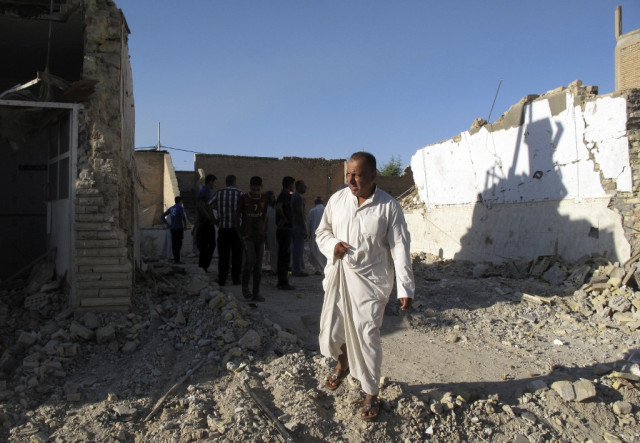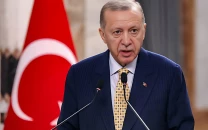September marked by bloody sectarian attacks in Iraq
Violence reaches a level unseen in Iraq since 2008 killing nearly 1000 people.

Violence reaches a level unseen in Iraq since 2008 killing nearly 1000 people. PHOTO: REUTERS
Violence has reached a level unseen since 2008, and there are fears Iraq is slipping back toward the intense Sunni-Shia bloodshed that peaked in 2006-2007 and killed tens of thousands.
"September has seen a rise in mass-casualty bombings aimed at crowded areas. There has also been an increase in the killing of whole families in shooting attacks," said John Drake, an analyst with risk management firm AKE Group.
"Radical groups are likely intent on stoking an angry response from the Shia community," he said.
That "will polarise society further and drive many in the Sunni community to seek protection from whoever they think represents them the best and has the best chance of physically defending them."
Figures compiled by the United Nations, the Iraqi government and AFP all showed a spike in violence in September.
The UN put the September death toll at 979, while government figures showed 971 deaths, and AFP recorded 880 - respective increases of 175, 528 and 187 from August.
The September toll was the highest recorded by AFP all year, with almost 400 deaths occurring in the last 10 days of the month alone.
In a sign of the worsening situation, the cabinet on Tuesday approved temporary pay raises of 50 percent of salaries or up to about $416 for security forces in seven "hot areas" including Baghdad, a government statement said.
Of the 19 people killed in attacks on Tuesday, 15 were security forces members or guards.
Soldiers, police and other government employees are often targeted by militants in Iraq.
A justice ministry spokesman meanwhile said Iraq put 23 people to death over two days last month, 20 of them for terrorism-related offences, despite widespread international calls for a halt to executions in Iraq.
On Monday, attacks including 12 car bombs mainly targeting Shia areas in and around Baghdad killed 52 people in Iraq.
An al Qaeda front group has since claimed responsiblity for coordinated attacks against Shias.
Militants carried out a series of sectarian attacks on both Sunni and Shia mosques, funerals and other targets in September, the deadliest of which were bombings against Shia mourners in Baghdad that killed 73 people on September 21.
A suicide bombing at a Shia mosque south of Baghdad also killed 47 people, while five attacks against Sunni funerals and mosques killed more than 50.
The UN refugee agency has said it is "increasingly concerned about the situation in Iraq, where recent waves of sectarian violence threaten to spark new internal displacement of Iraqis fleeing bombings and other attacks."
It said about 5,000 Iraqis had already been displaced in 2013, joining more than 1.13 million who fled or were forced out of their homes in previous years.
Iraq has seen a surge in violence this year, especially since security forces stormed a Sunni anti-government protest site in northern Iraq on April 23, sparking clashes that killed dozens of people.
"This prompted a violent backlash from armed Sunnis frustrated with what they perceive to be marginalisation by the government," Drake said.
"Groups such as al Qaeda in Iraq sought to capitalise on the mood by conducting large-scale attacks against the government and security forces," he said.
The Shiite-led Iraqi government has made some concessions aimed at placating anti-government protesters and Sunnis in general, such as freeing prisoners and raising the salaries of Sunni anti-al Qaeda fighters, but underlying issues have yet to be addressed.
"At the same time, with groups such as al Qaeda fighting more openly in Syria, they likely feel that they have a real chance to carve out an area of influence crossing the border of the two countries," another motivator for increased operations, Drake said.
So far this year, more than 4,700 people have been killed and over 12,000 wounded in attacks, according to AFP figures, meaning that roughly one in every 2,000 Iraqis has been killed or wounded in 2013.


1725099588-0/BeFunky-(41)1725099588-0-208x130.webp)
















COMMENTS
Comments are moderated and generally will be posted if they are on-topic and not abusive.
For more information, please see our Comments FAQ